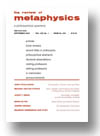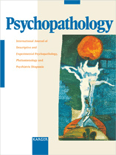
Dialogues in Philosophy Mental and Neuro Sciences
Scope & Guideline
Advancing Knowledge at the Intersection of Thought and Science
Introduction
Aims and Scopes
- Phenomenological Approaches to Mental Health:
The journal emphasizes the use of phenomenological methods to study mental health conditions, focusing on subjective experiences such as hallucinations and their implications for understanding consciousness. - Interdisciplinary Research:
It promotes interdisciplinary dialogue, particularly between philosophy, psychology, and neuroscience, fostering a comprehensive understanding of mental phenomena and their neurobiological underpinnings. - Psychopathology and Subjectivity:
The journal explores the subjective aspects of psychopathology, investigating how personal and cultural narratives shape mental health experiences and disorders. - Critical Reflections on Psychiatry:
There is a consistent focus on critiquing psychiatric practices and concepts, examining how societal and political contexts influence mental health diagnoses and treatments. - Cultural and Historical Contexts:
The journal often situates psychological phenomena within broader cultural and historical frameworks, addressing how these contexts affect the understanding and treatment of mental health issues.
Trending and Emerging
- Exploration of Hallucinations:
A notable increase in studies focusing on hallucinations, particularly auditory hallucinations, highlights a growing interest in understanding these phenomena from both phenomenological and neuropsychological perspectives. - Impact of Trauma on Mental Health:
Themes relating to trauma, especially complex PTSD and its manifestations, have surged. This trend underscores the importance of understanding the psychological aftermath of trauma in a holistic manner. - Transdisciplinary Approaches to Mental Health:
There is a rising trend towards transdisciplinary research that intersects various fields, such as phenomenology and neuroscience, to address mental health issues in a comprehensive manner, particularly in response to contemporary challenges like the pandemic. - Philosophical Reflections on Consciousness:
Increasingly, the journal features philosophical inquiries into the nature of consciousness, particularly regarding subjective experiences related to mental health, indicating a deeper engagement with foundational philosophical questions. - Societal Influences on Psychopathology:
Emerging discussions on how societal and political contexts shape mental health experiences reflect a trend towards understanding psychopathology as a socially embedded phenomenon rather than an isolated clinical issue.
Declining or Waning
- Traditional Psychological Diagnoses:
There seems to be a diminishing focus on traditional psychological diagnoses, such as those strictly outlined in DSM classifications. Instead, there is a shift towards a more nuanced understanding of mental health that incorporates personal and subjective experiences. - Biological Reductionism:
Research that heavily emphasizes biological or neurochemical explanations for mental disorders is becoming less prevalent. The journal is increasingly favoring integrative approaches that consider psychological, social, and philosophical dimensions. - Historical Studies of Mental Illness:
While historical perspectives were previously explored, there appears to be a waning interest in purely historical analyses of mental illness, with more emphasis now placed on contemporary implications and interdisciplinary approaches.
Similar Journals

Phenomenology and the Cognitive Sciences
Innovating Connections Between Thought and ExistencePhenomenology and the Cognitive Sciences is a leading interdisciplinary journal published by Springer, dedicated to exploring the intersections of cognitive science and phenomenological philosophy. Since its inception in 2004, this journal has established itself as a vital resource for researchers and scholars, achieving Q2 status in Cognitive Neuroscience and Q1 in Philosophy according to the 2023 Category Quartiles, highlighting its significance in both fields. With an ISSN of 1568-7759 and an E-ISSN of 1572-8676, the journal provides a platform for innovative research, fostering insightful dialogues that bridge the gaps between cognitive processes and human experience. Its current Scopus rankings place it in an impressive 97th percentile for Philosophy and 59th percentile for Cognitive Neuroscience, reflecting its academic impact. Although not an open-access journal, researchers and students can access its rich repository of articles to deepen their understanding of how cognitive science informs philosophical inquiry and vice versa, making it an indispensable tool for anyone committed to advancing knowledge in these vital areas.

Rivista Internazionale di Filosofia e Psicologia
Advancing Knowledge Through Interdisciplinary Dialogue.Rivista Internazionale di Filosofia e Psicologia, published by MIMESIS EDIZIONI in Italy, is a premier open-access journal that has been serving the academic community since 2010. With an ISSN of 2039-4667 and E-ISSN 2239-2629, the journal has established itself as a significant platform for interdisciplinary research in philosophy and psychology. It has been recognized in key quartiles, including Q2 in Philosophy and Q4 in both Experimental and Cognitive Psychology as well as Social Psychology for the year 2023. Despite its emerging status in certain psychology domains, the journal offers a vibrant forum for innovative discourse and novel ideas that bridge philosophical inquiry and psychological practices. The H-Index and citation metrics reflect its growing influence in the arts and humanities sectors, particularly in its specialized fields. By embracing open access, the journal ensures wide dissemination of knowledge, making it an invaluable resource for researchers, professionals, and students alike who are eager to explore the intersections of these vital disciplines.

Prometeica-Revista de Filosofia y Ciencias
Fostering Innovative Dialogue in Philosophy and SciencePrometeica-Revista de Filosofia y Ciencias, published by LUCAS EMMANUEL MISSERI in Argentina, serves as a pivotal platform in the realms of philosophy and the history of science since its establishment in 2010 as an Open Access journal. With an ISSN and E-ISSN of 1852-9488, this journal not only emphasizes accessibility but also engages a diverse audience encompassing researchers, professionals, and students eager to explore the intersections of philosophical inquiry and scientific understanding. As of 2023, Prometeica boasts a commendable Q2 ranking in Philosophy and a Q3 ranking in the History and Philosophy of Science, reflecting its growing influence in academic discourse. Despite its rising status, with Scopus rankings indicating a niche yet dedicated readership, the journal remains committed to fostering innovative dialogue and critical thought in the philosophical community. This strategically positioned journal invites contributions that not only advance theoretical perspectives but also address contemporary issues within the philosophical and scientific domains, ensuring relevance and impact for its readers.

Investigaciones Fenomenologicas
Unveiling Consciousness Through Rigorous InquiryInvestigaciones Fenomenologicas is a pioneering journal in the field of phenomenological research, dedicated to exploring the depths of human experience and consciousness. Published by the UNIV NACL EDUCACION & DISTANCIA-UNED in Madrid, Spain, this journal serves as a vital platform for scholars and practitioners who strive to deepen their understanding of phenomenology and its applications in various disciplines, including psychology, education, and the social sciences. With a commitment to fostering intellectual dialogue, Investigaciones Fenomenologicas invites contributions that challenge conventional paradigms and enrich the academic landscape through empirical studies, theoretical discussions, and critical analyses. While currently not open access, the journal’s exclusive focus on phenomenology makes it an essential resource for researchers and students aiming to stay abreast of the latest developments and methodologies in this evolving field. ISSN: 1885-1088.

PHILOSOPHICAL PSYCHOLOGY
Illuminating Human Experience with Philosophical InquiryPHILOSOPHICAL PSYCHOLOGY, published by Routledge Journals, Taylor & Francis Ltd, stands at the intersection of philosophy and psychology, providing a unique platform for the exploration of how philosophical concepts inform psychological theories and practices. With a publication history dating back to 1988 and continuing through 2024, this journal offers researchers, professionals, and students a prestigious forum to disseminate their findings and insights, contributing significantly to both the Applied Psychology and Philosophy fields. The journal has achieved a notable impact factor, underscored by its ranking in the top quartile of Philosophy and third quartile in Applied Psychology, according to the 2023 category quartiles. Researchers can access a wealth of multidisciplinary studies, discussions, and theoretical analyses that enhance the understanding of human behavior and cognition through a philosophical lens. This makes PHILOSOPHICAL PSYCHOLOGY an essential read for anyone engaged in the critical examination of psychological phenomena.

EVOLUTION PSYCHIATRIQUE
Navigating the Landscape of Psychiatric EvolutionWelcome to EVOLUTION PSYCHIATRIQUE, a prominent journal in the field of Psychiatry and Mental Health published by ELSEVIER FRANCE-EDITIONS SCIENTIFIQUES MEDICALES ELSEVIER. With a rich publication history dating back to 1948, this journal serves as a critical platform for the dissemination of cutting-edge research and insights within the realm of mental health. As of 2023, it has attained a commendable position in the Q2 quartile for Arts and Humanities and Q4 for Psychiatry and Mental Health, reflecting its diverse contributions to the scholarly community. The journal’s unique scope encompasses both theoretical and empirical studies that inform and invigorate the dialogue surrounding psychiatric evolution. Despite its current non-open access status, EVOLUTION PSYCHIATRIQUE remains a pivotal resource for researchers, clinicians, and students alike, offering valuable perspectives that illuminate the complexities of mental health across different genres of study and practice. Through rigorous peer review and a commitment to scientific integrity, this journal continues to foster advancements and discussions that are essential for the progress of psychiatry in contemporary society.

RESEARCH IN PHENOMENOLOGY
Fostering Interdisciplinary Dialogue in PhilosophyRESEARCH IN PHENOMENOLOGY, published by BRILL, stands as a vital academic journal dedicated to the exploration of phenomenological research within the realm of Philosophy. With an ISSN of 0085-5553 and an E-ISSN of 1569-1640, this journal has been a respected platform since its inception, reflecting a rich history spanning from 1971 to the present. Despite not currently offering open access, it provides invaluable insights and scholarly articles that contribute significantly to the understanding of phenomenology and related disciplines. The journal holds a prestigious Q3 ranking in the 2023 category of Philosophy, with a Scopus ranking of 409 out of 806 in Arts and Humanities, indicating a solid standing in academic discourse. Academics, researchers, and students alike are encouraged to engage with the cutting-edge studies published in this journal, which serves as an essential resource for advancing phenomenological thought and fostering interdisciplinary dialogue.

Psychiatry Psychology and Law
Pioneering Research in Psychiatry and Legal StudiesPsychiatry Psychology and Law is a prestigious journal dedicated to advancing the understanding of the interconnections among mental health, psychological conditions, and legal contexts. Published by Routledge Journals, Taylor & Francis Ltd, this journal plays a pivotal role in the field, evidenced by its impressive Q1 ranking in Law and notable positions in multiple disciplines such as Psychiatry and Forensic Medicine. With a commitment to disseminating high-quality research, it has established itself as an essential resource for researchers, professionals, and students in psychology and legal studies. While currently not offering Open Access options, the journal thrives on rigorous peer review processes that ensure only the most impactful studies from its inception in 1994 to the present are published. Covering a diverse range of topics, Psychiatry Psychology and Law fosters interdisciplinary dialogue and innovation, making it a vital platform for advancing scholarly discourse in the critical intersection of mental health and law.

REVIEW OF METAPHYSICS
Fostering critical perspectives on the essence of existence.REVIEW OF METAPHYSICS is a distinguished journal published by PHILOSOPHY EDUCATION SOC, INC, dedicated to advancing scholarly discourse in the field of philosophy. With an ISSN of 0034-6632 and an E-ISSN of 2154-1302, this journal has been a crucial platform for philosophical inquiry since its inception in 1975, converging its rich content from 1992 and continuously serving the academic community up to 2022. Based in the United States, specifically at 223 Aquinas Hall, Catholic University America, Washington, DC, it has secured a reputation for quality, reflected in its placement within the Q3 category of the 2023 Philosophy rankings, and a Scopus rank of 367 out of 806 in Arts and Humanities, placing it in the 54th percentile. Although it does not offer open access options, the REVIEW OF METAPHYSICS remains an essential resource for philosophers and students alike, fostering critical perspectives on metaphysical issues, and thereby contributing significantly to the advancement of philosophical studies.

PSYCHOPATHOLOGY
Advancing the Understanding of Mental HealthPSYCHOPATHOLOGY, published by KARGER, is a prestigious academic journal that has been a cornerstone in the fields of clinical psychology and psychiatry since its inception in 1968. With a robust impact factor and a commendable ranking within the upper quartiles (Q1) of its categories for 2023, the journal is recognized for its rigorous peer-reviewed articles that contribute significantly to the understanding and treatment of mental health disorders. Hailing from the beautiful country of Switzerland, this journal not only fosters innovative research but also encourages interdisciplinary collaboration among scholars, practitioners, and students alike. Although currently not an Open Access journal, it continues to provide valuable insights, enhancing the understanding of psychopathological phenomena and promoting better clinical practices. With a commitment to excellence, PSYCHOPATHOLOGY aims to disseminate crucial findings and innovative methodologies that shape the future of mental health research.